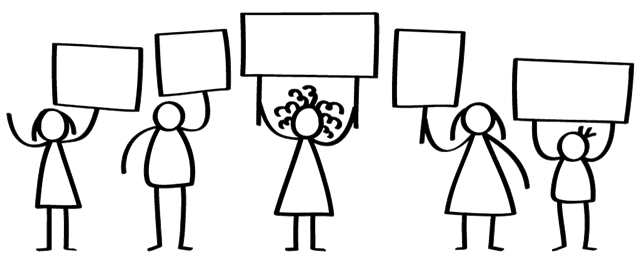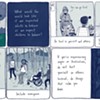Published April 3, 2018 at 10:00 a.m.
It was a stairwell moment, walking up the steps to my office on February 27, 2012, that completely altered my course. The world had just lost Trayvon Martin, an unarmed black teenager from Florida, at the hands of George Zimmerman, a neighborhood watch coordinator with a gun. I, like so many others, was struggling to understand this senseless act of violence.
As I walked up to my desk at Shelburne Farms, where I worked as the school programs coordinator, I struck up a conversation with my colleague, Sarah. My initial reaction to the shooting was that Trayvon could have been one of our students. "No," Sarah responded, reflecting on our predominantly white classrooms full of students unaware of their privilege. "It's far more likely that we're teaching a future George Zimmerman."
Our conversation that day set in motion the journey I continue on today. Sarah helped me recognize that I cannot simply try to protect or "save" potential victims; instead, I must work toward preventing the creation of future perpetrators.
This call is not a simple one. It requires shifting systems of power and oppression, and inviting marginalized students, whose voices aren't often heard, to take the lead. These young people are capable of revolutionary dreaming, the kind we see in the Black Lives Matter movement, as well as among the courageous survivors of the high school shooting in Parkland, Florida. They see that change is not only possible, but necessary.
Perhaps it's because I saw my role as one of savior, rather than collaborator, that I have been surprised, at times, by the courage, eloquence and organizing capacities of our young people.
I've since learned to acknowledge the incredible shoulders on which they stand — shoulders that belong to Claudette Colvin, who was 15 when she refused to give up her seat on a bus in 1955, nine months prior to Rosa Parks. Those of the Little Rock Nine, who ranged in age from 14 to 17 as they fought to desegregate our nation's schools. Those of 10-year-old Mari Copeny, who was only 8 when she began advocating for healthy drinking water in Flint. And those of the young people in the One Mind Youth Movement, whose members stood their ground at the Standing Rock Sioux Reservation in 2016 because they believed our nation's water was in danger. Each of these amazing activists not only stood for change, but had the imaginative power to see that it was possible.
The revolutionary imagining I see in today's young people gives me hope. At Frederick H. Tuttle Middle School in South Burlington, where I teach sixth-grade social studies, I co-facilitate a Peer Leadership program. We recently met with a group of student leaders who had, without the intervention of adults, formulated a vision statement, action plan, leadership structure and motivational writings to address gun violence as part of an organized walkout, an initiative they called "Operation Overcome." They spread word of their movement in the way many such movements are being shared — through social media, with the help of Google documents and folders.
As we sat together in a circle, Sabrina, a sixth grader, raised her hand to speak to Maddie, an eighth grader. Days earlier, Maddie had posted a powerful poem she had written in response to the school shooting in Parkland on Instagram. "Maddie," Sabrina said, "it was because of your poem that I realized life doesn't have to be this way."
In my 10 years of working with youth, as a Peace Corps volunteer at a village school in Nedryhailiv, Ukraine, as an educator at Shelburne Farms, and now as a public school teacher, I have had the incredible joy of witnessing young people advocate for change.
In Nedryhailiv, my students conducted a needs assessment in their community and determined that our youngest learners and their families could benefit from a summer program. A group of 15 Ukrainian teens put on a week-long day camp for elementary school students. For five summers, my world was rocked as teenage campers at Shelburne Farms created an incredible community together — cooking, swimming, hiking, biking, and sharing vulnerable truths about themselves and the world they were inheriting over a campfire. Last year, when hate speech was sprayed across the turf at FHTMS, our sixth graders chose to cover that same area with posters carrying messages of love and forgiveness.
Over and over again, my students have demonstrated that early adolescence is uniquely messy and challenging, but it is also powerful and visionary, largely because young people have not lost the capacity to dream. That skill, which allowed them to slay dragons or fly to the moon when they were smaller, now enables them to envision a world in which systems of power and oppression are called into question. Their creativity, coupled with a fierce drive toward equity, has played out on buses, in the streets of Ferguson, and now at podiums and in marches.
Author and hip-hop educator Christopher Emdin recently stated, "You don't teach activism, you create the conditions to allow young people to imagine a more just world." This is the work that young people are absolutely primed to do. When adults position themselves as collaborators, rather than "leaders," the potential for change is as limitless as young people's imaginations.
This article was originally published in Seven Days' monthly parenting magazine, Kids VT.
Speaking of...
-

Summit Not Required: Reconsidering the Race to the Top
Aug 22, 2023 -

Use Your Words: A Mom and Early Childhood Educator Explains What She Learned About Managing Her Fear of the Climate Crisis
May 23, 2023 -

The Over-60 Crowd Steps Up With Bill McKibben's Climate Action Group Third Act
Mar 29, 2023 -

Rise and Shine? A Food Writer Navigates a Nauseous First Trimester
Feb 28, 2023 -

A Youth-Activism Camp in Marshfield Stands Up to a Zoning Complaint From the Town
Feb 1, 2023 - More »
Comments (6)
Showing 1-6 of 6
Comments are closed.
From 2014-2020, Seven Days allowed readers to comment on all stories posted on our website. While we've appreciated the suggestions and insights, right now Seven Days is prioritizing our core mission — producing high-quality, responsible local journalism — over moderating online debates between readers.
To criticize, correct or praise our reporting, please send us a letter to the editor or send us a tip. We’ll check it out and report the results.
Online comments may return when we have better tech tools for managing them. Thanks for reading.











































